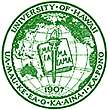
Filipino classes
at UH feel pinch
Growing enrollment puts a
strain on the Manoa department
Students and faculty at the only four-year Filipino (Tagalog) and Ilocano language programs in the nation are feeling uneasy about their future at the University of Hawaii-Manoa as the school struggles to balance an increase in enrollment without an increase in funds.
 "The budget is flat. We have more students. That's where the problem comes in," said Joseph O'Mealy, interim dean of the College of Languages, Linguistics and Literature. "It's not that the budget has been cut, it's just that there isn't enough money for the additional students."
"The budget is flat. We have more students. That's where the problem comes in," said Joseph O'Mealy, interim dean of the College of Languages, Linguistics and Literature. "It's not that the budget has been cut, it's just that there isn't enough money for the additional students."
Prompted by concerns that Philippine language classes might be cut next spring, a student Filipino language and culture group has organized to express its support for their program.
"We shouldn't have to fight for it so hard like this. We shouldn't have to worry if we're going to have our class next semester," said Dave Doles, a senior majoring in Filipino language and literature and the head of the student group Katipunan.
Ruth Mabanglo, a professor of Filipino language, said her program depends on lecturers to teach first- and second-year Filipino and that when there are budget cuts, lecturers are the first to go.
"We are very unstable," Mabanglo said. "We are always afraid of being cut."
Doles and Mabanglo said that the number of lecturer positions that might be eliminated could have a significant effect on the program.
However, O'Mealy said cuts, if any, would not affect students now taking language courses.
O'Mealy said students can currently take beginning Filipino and Ilocano in both the fall and the spring. What is being considered is to eliminate Filipino and Ilocano 101 classes that are "off cycle" -- that start in the spring -- so that eventually only one cycle of language classes that start in the fall are offered.
"There's some attempt in the department to figure out how to stay within the budget," O'Mealy said.
But O'Mealy said he thinks the department might be able to get enough money to keep the program going without any cuts.
He said he plans to meet next week with UH-Manoa Vice Chancellor for Academic Affairs Neal Smatresk. "I think we'll be able to convince him that Filipino is unique to this university," O'Mealy said.
The students are planning a panel discussion on the future of their program on Sept. 15 at 11:30 a.m. in the Campus Center. They have invited university and elected officials.
Doles said Filipinos are underrepresented at UH-Manoa and that the Philippine language programs can attract students to learn about their language and culture.
"We're actually trying to plan a high school outreach. We want to increase knowledge about the Filipino programs," he said.
"Our students have nowhere else to go," Mabanglo said. "They would be forced to take classes like Spanish or French (to meet the language requirement for graduation) that are not related to discovering themselves."
The lack of classes is complicated by the retirement of Teresita Ramos, the professor who started the Filipino language program at UH. Three years ago the program began offering bachelor's degrees in Filipino and Ilocano language and literature -- the only such degree programs offered outside the Philippines.
"I think our students are very concerned about the growth of the program," she said.
Currently, about 200 students take Filipino classes, and another 100 are taking Ilocano.
www.hawaii.edu